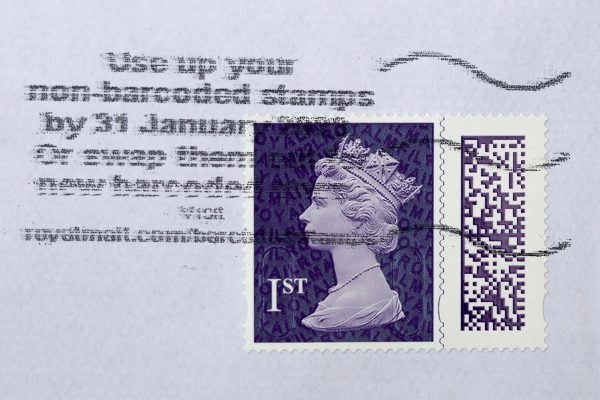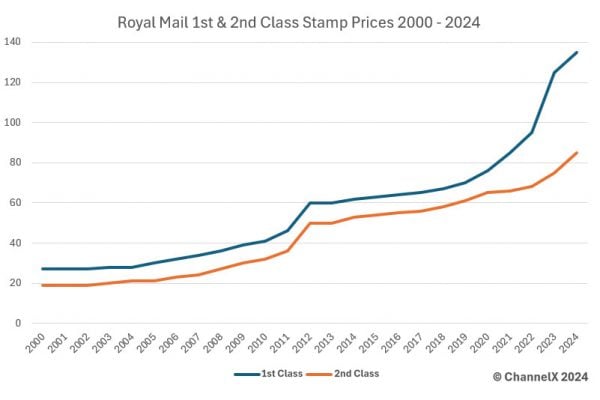The Royal Mail has announced its results for the first half of the year. In its last full half year before privatisation it did well delivering a pre-tax profit of £283 million.
Indeed the process that moved Royal Mail towards sell-off did help the results. Debts were reorganised, they received a £35m VAT credit from HMRC and incurred lower than anticipated “transformation costs”. The profits represent a notional earning per share of 16.8p.
It does make me wonder. Privatisation is for state-owned firms that aren’t operating in a businesslike fashion. Delivering what is, by any measure, a decent profit surely shows that that RM wasn’t broken and in need of the commercial touch.
It’s also worth noting that parcels now represent 51% of Royal Mail’s revenues. You can read the full details here on the Royal Mail plc website.
This news comes on top of an announcement that the Common business committee will examine whether Royal Mail was sold off too cheaply. Shares are now changing hands at around 560p each after a float price not so many weeks ago of 330p










9 Responses
Privatisation is an ideological agenda. Can anyone think of a natural monopoly that has beneifitted from privatisation? Pats on the back and brown envelopes all round, boys.
In the case of Royal Mail though we can only wait and see what happens and get ready to jump ship (no pun intended) if necessary.
This just shows how insane the government’s policy was to privatise the company when it did. Shareholders have made a 70% return on investment in less than 2 months, while all other tax payers have lost out.
Ian
I think you have a misunderstanding of how these things work and are jumping on the media bandwagon.
The pricing was not the sort of farce that the media / politician have led the public to believe. The banks will recommend a price and it is often hoped that the price will increase post IPO.
One of the reasons for this is that if the price tanked, you can imagine good old media and politicians and the guardian lot will have an even greater time heckling about how the poor retail investor was duped.
If anything the banks slightly undervalued RM, however getting the exact valuation is a difficult task and larger investors showed much less enthusiasm at a price offered above.
It is too early to tell whether current valuations will be sustained and it is too short term to assume that the current price will be the future price.
RM privatization is a good thing as well – it will allow the company to modernise and compete with the growing competition in the UK. Yodel, Hermes and all those other independent postal companies might not be up to scratch now – but they will get better (this is the nature of competition) and if anything it will force RM to stay on their toes and improve. Competition = better for all of us. Publicly run companies are usually inefficient and have poor management. RM is not an efficient company and has much room to improve.
Goldman Sachs was one of the Banks advising Government Ministers over the Pricing of the Royal Mail Privatisation. They advised the 330p price. Yet at the same time Goldman Sachs were advising their investment clients that the actual value of the shares was 610p. The difference of course was the loss to the Taxpayers of the UK and represented many New Schools, Hospitals etc.
There is a fairly simple way of valueing a Business, any business. Obviously the bigger and more complicated the business is the longer it takes to value it. But at the end of the day its value is whatever you can get somebody to pay for it.
Surely there is a very substantial conflict of interest if a Bank such as Goldman Sachs is advising the Government on the value of the business and at the same time is valuing the business in regard to its own investment arm and for its investment customers. In an ideal world the price should be the same.
But then the Government has to price the share issue. There has to be some profit in the sale or nobody would invest in it. So if the value divided by the number of shares gave a value of £5 and that was your issue price it is unlikely that you would get anybody to invest in it. So if the value of the business equated to £5 you would probably price the issue at £4-50 so giving the investors an immediate 50p profit. The trouble seems to be that as so often over the years the Banks have been far too greedy.
Chris
Banks have ‘chinese walls’. Different departments within the same bank will do and advise on different things and without speaking to each other or being aware of the other departments advice.
With regulatory requirements and indeed strong penalties, banks do enforce these walls – so you might have one department advising something completely the opposite to another department.
This isn’t uncommon and is not restricted to the banking sector.
I agree that this is how it is supposed to work. However taking into account that the 2 or indeed more than 2 differing sections of the Bank will be working with essentially the same raw data. It should be that the answers that they come to are essentially the same or very similar.
However in regard to the Sales of Royal Mail one section of the Bank was advising the Government that the value of the Royal Mail was £3.30 per share While another section of the Bank was advising its Investment Customer and indeed was basing its own Investment plans on the shares being worth £6-10 each.
IOt is certainly true that all the Banks are supposed to opetrate to a set of Rules and Regulations. However over the last few years and probabnly for yerars possibly decades before that we know that those very same Banks were completely disregarding the Rules and Regulations. If in those areas why not in the area of the Share Sale of Royal Mail.
There are various investigations being carried out at present and no doubt they will disclose that various underhand and probably illegal activities were happening. However how many Bankers have been prosecuted and imprisoned for the other crimes that have been found up till now? So we can expect that nothing will be done when the crimes are disclosed about the sell off of Royal Mail.
After all the massive losses are to be carried by the General Public and the Public Sector always considers that the General Public (ie you and me and millions like us) have a bottomless pocket that the Bureaucrats and Politicians can drain for ever.
I would again argue that the sell off was unnecessary and should never have happened. Also I am not convinced that the Privatisations of the Thatcher era should have happened. In just about every case the ultimate victim has always been the General Public.
Chris
Raw data can be interpreted in many ways. A department advising the government is advising based on where they think they should offer the company. A department advising investors will advise the client based on where they ‘think’ prices will go in the short/medium/long term.
Now you have to realise that unlike purchasing shares, offering shares for sale is a long planned process. You cannot offer a price one day and change it the next. Prices can be moved but it happens very rarely and only with very good reason.
The banks did advise the government prior to the offering that they could have maybe gotten an extra £0.20 (above £3.30), however advised (quite rightly) against it.
You see the prices the banks advise to value the offering aren’t just plucked out of thin air. They will partly base the valuation on the financial state of the company, investor demand and valuation and of course the sellers own input.
In this case, investors (investors could be pension funds, hedge funds, other banks etc.) had indicated that they would be prepared to buy at a price range around the issue price of £3.30.
Put it this way, if you had something to sell and took it to 10 big customers (say for example a multinational retailer) and all 10 of them said they would only be prepared to offer around £3-3.50, would you then price it on the market for £5, or advise your client to sell for £5?
At the end of the day there were (and remain) large concerns about Royal Mail, including future profitability, industrial action concerns etc.
Re your comment about banks and crimes and bankers are bad and privatisation is bad. This is a different topic and we would argue ) to the end of days 🙂 (I don’t agree with most of what you say!
Apart from my Political Past I would remind you that for several years I worked as an Accountant in Industry. While some of what you say may have some validity the fact is that the General Public has suffered a very serious loss caused by the valuations given(at great cost) by the very same Banks and Financial Institions that were up to their necks in so many previous Financial Scandals.
The General Publics Loss on the sale of the Royal Mail represents so many New Hospitals, Schools etc that will have to be paid for in other ways while the Bankers will be sitting at home counting out their even more massive bonuses that they have “earnt” because yet again they have managed to con the Government and the Civil Servants.
From the Raw Data it may be that dfiferent figures can be produced. However they should be within a relatively tight set of boundaries. Then from those valuations you produce a further set of valuations. Obviously for the Government “What will it sell for”. For the Investors “What will it be worth in 6, 12, 24 months time”.
I agree that these valuations will be very different but again they should be within acceptable boundaries.
The trouble does seem to be that the Banks set out to get the Government to sell the Royal Mail for the very minimum price. Way below what the market would have paid. If you do not believe me just look at how many times over subscribed it was. If it had been over valued it might not have sold out. If it was totally subscribed it might have been towards the top figure that the market would have paid. But over 5 x or 10 x overscribed then it was obviously well under priced.
In other words the Banks and the Government and its Civil Servant advisers got it wrong. The big question is now was the Banks advising a miniscule price way under what the market would have paid out of Gross Incompetance or because they wanted to maximise the profits of their Investment Arms and their Investment Customers at the expence of the General Public.
I hope that the enquiries find the answer to this. If it is that the Government and its Civil Servants were conned then heads must roll and in very large numbers. But the Bankers doing the conning must also face massive fines and imprisonment (something that has not happened and should have for all the other Financial Scandals that have originated within the Banking Industry).
I was not aware of your political past as I have only recently started to frequent this website.
If anything I think the blame lies more with the original pool of investors who advised the banks of their target price range. Although this isn’t really a blame, it’s just the nature of the game. How accurate can someone price something that is difficult to value….
Neither of us can be certain whether there was an attempt to deceive or manipulate the public. I guess these ‘inquiries’ will help get some more information out – however having politically motivated (and totally clueless) MP’s grill far more educated and capable bankers about this – isn’t the right to go about it. Also after the froth has settled, say 6-12 months after offer, it would be best to see the share price and how the offer was reflected. It is early days, and any rumbling is simply a response of the political class to media rumbling.
In terms of fines and imprisonment, politicians should be the first on the chopping board. The crimes, deceit and recklessness caused by this one class are far more pervasive and damaging than any banker could possibly do.
I see the world progress in so many ways – technology is moving at a super fast pace, advancements are growing day in day out. Competition is rife and companies come and go – however the only sector in our society that seems stuck in slow mode is the political class. It only cares about whether it can get into power next time round and how to go about duping the population to vote for it. There is never an attempt to do what is best for the country, but best for itself (and this applies to all parties)